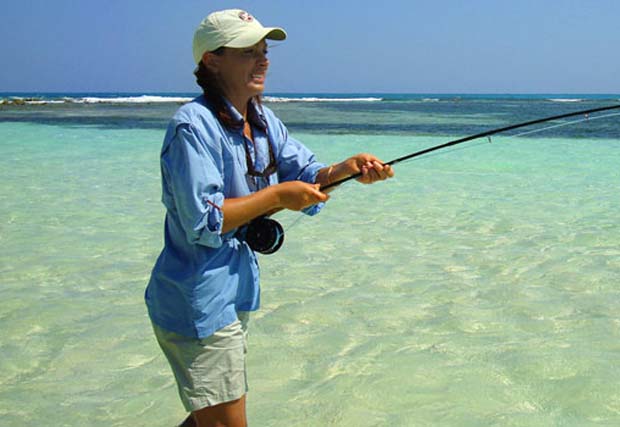Landmark Vision for Saltwater Recreational Fisheries Management Unveiled by Policy and Industry Experts
Blue ribbon commission recommends enhanced fisheries management while upholding saltwater recreational fishing’s economic, social and conservation benefits
Miami, Florida / February 13, 2014
[dropcap]A[/dropcap] landmark report produced by the Commission on Saltwater Recreational Fisheries Management presents a new paradigm for conserving marine fishing resources while producing the full range of saltwater recreational fishing’s economic, social and conservation benefits.
Introduced today at the 2014 Progressive Miami International Boat Show in Miami, Florida. A Vision for Managing America’s Saltwater Recreational Fisheries outlines the nation’s most important recreational fisheries management issues and is intended to help guide federal policy decisions, particularly as Congress debates the reauthorization of the Magnuson-Stevens Fishery Conservation and Management Act, the law that governs the nation’s marine fisheries.
Co-chaired by Bass Pro Shops Founder and CEO Johnny Morris and Maverick Boats President Scott Deal, the commission, composed of respected biologists, economists, conservationists, fisheries managers and policy makers, developed specific management recommendations for keeping saltwater recreational fishing sustainable and healthy. The commission advanced an innovative and results-oriented approach to marine fisheries management.
A Vision for Managing America’s Saltwater Recreational Fisheries “For many reasons, I’m deeply committed to protecting and enhancing our nation’s fisheries to ensure a bright future for the great American tradition of fishing. It’s not only vitally important to our economy, it’s also very important to our society and for getting kids connected to the outdoors and understanding the need for conservation,” said Morris. “Sharing our outdoor heritage with our children and grandchildren means we must work hard now to improve saltwater recreational fisheries management.”
“It’s an honor to participate in the commission’s work and in the development of this landmark document,” said Deal. “This is the first time the recreational fishing community and the fishing and boating industries have clearly set forth what we believe the majority of the nation’s recreational anglers want regarding our saltwater fisheries laws, management policies and regulations.”
The economic imprint of saltwater angling in the U.S. is considerable. In 2011, approximately 11 million Americans saltwater fished recreationally, spending $27 billion in pursuit of their sport. That activity generated more than $70 billion in economic output and sustained 450,000 jobs. Anglers contribute more than $1.5 billion annually to fisheries habitat and conservation via excise taxes, donations and license fees alone.
Throughout 2013, members of the blue ribbon commission met to deliberate and debate strategies to improve saltwater recreational fisheries management. A wide range of experts and other stakeholders, including economists, researchers, federal and state agency administrators, environmentalists, charter captains and individual recreational anglers, were invited to meet with the commission to provide information and advice on a variety of fisheries management issues. The report released today reflects their input.
A Vision for Managing America’s Saltwater Recreational Fisheries identifies six key policies that would achieve the commission’s vision. Those recommendations primarily focus on the Magnuson-Stevens Act.
The recommendations include:
[highlight color=”white”]…[/highlight]Establishing a national policy for recreational fishing
[highlight color=”white”]…[/highlight]Adopting a revised approach to saltwater recreational fisheries management
[highlight color=”white”]…[/highlight]Allocating marine fisheries for the greatest benefit to the nation
[highlight color=”white”]…[/highlight]Creating reasonable latitude in stock rebuilding timelines
[highlight color=”white”]…[/highlight]Codifying a process for cooperative management
[highlight color=”white”]…[/highlight]Managing for the forage base
“I’m grateful to be a part of this historic effort to strengthen our laws, policies and practices that affect saltwater recreational fisheries management,” concluded Morris. “On behalf of all anglers and future generations of anglers, I want to offer sincere thanks to the many partners who came together to serve on this panel. They have been guided by the common goal of ensuring that the vision we share regarding saltwater recreational fishing plays an important role when Magnuson-Stevens is reauthorized.”
About the ASA:
The The American Sportfishing Association (ASA) is the sportfishing industry’s trade association committed to representing the interests of the entire sportfishing community. We give the industry a unified voice, speaking out on behalf of sportfishing and boating industries, state and federal natural resource agencies, conservation organizations, angler advocacy groups and outdoor journalists when emerging laws and policies could significantly affect sportfishing business or sportfishing itself. ASA invests in long-term ventures to ensure the industry will remain strong and prosperous, as well as safeguard and promote the enduring social, economic and conservation values of sportfishing in America. ASA also gives America’s 60 million anglers a voice in policy decisions that affect their ability to sustainably fish on our nation’s waterways through KeepAmericaFishing™, our angler advocacy campaign. America’s anglers generate over $48 billion in retail sales with a $115 billion impact on the nation’s economy creating employment for more than 828,000 people.

